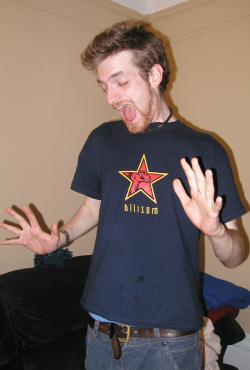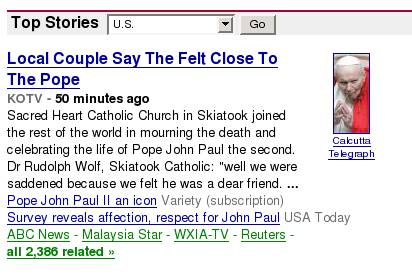I have a unofficial policy of not writing "this what I did today" blog entries. Today has been special so I’m going break my rule.
Yesterday night, I met up with Matt Norwood of Columbia Law School and soon-to-be of the Software Freedom Law Center to take a bus down to Washington DC to sleep on the sidewalk in front of the United States Supreme Court with the ultimate goal of seeing the oral arguments to Grokster v. MGM — an extremely important P2P case and probably the most important copyright and technology case since the Sony Betamax.
Seeing the case argued was an important goal but so was showing support for the EFF and for meeting a hole host of old friends (Seth Schoen, Wendy Seltzer, Annalee Newitz, Cindy Cohn) and for a meeting a few people on my "really should meet" list including Kragen Sitaker.
I met all of the people I’d hoped to met and many new smart and passionate freedom lovers, slept at the court and, through a rather sneaky set of events that I’ll detail tomorrow, managed to get into the court to hear the arguments. I was behind a column and at the very back of the room but I was one of the 35 people from the general public that got in so I can’t complain.
In my shamelessly biased opinion, I think the case was argued very well by our side and somewhat less well by the entertainment industry lawyers.
The industry lawyers were passionate but the passion behind the responses seemed to overshadow the substance of their argument. The justices asked the industry counsel repeatedly for a description of the legal standard that the industry would replace the simplified version of Betamax that Grokster is clinging to. The industry counsel repeatedly failed to answer these questions in a way that the Justices thought was satisfactory.
Justices that I suspected would be hostile toward Grokster’s position, including Justices Ginsberg and Scalia, returned repeatedly to the idea of the lone inventor in her garage unaware of exactly how she might predict the impact or use of her technology without being sued out of business from all sides before she had a chance to let the technology prove itself. They seemed concerned about the industry blocking the next Xerox machine, iPod, or printing press. Souter, Breyer, and Stevens each grilled the industry lawyers on their own. Rehnquist, who due to his respirator from his recent illness was tastelessly — but accurately — dubbed "Justice Vader" by one person at the court, said very little.
In what I’m sure is certainly a Supreme Court first, the justices asked, "what about the iPod?" Both counsels used hypothetical examples like, "so I want a file and you have it on your computer," that I thought introduced the fun idea of sharing music online with Supreme Court justices. Of course, I haven’t seen their iPods, but I suspect the Justices and I have different taste in music anyway.
The justices seemed comfortable with the technology at hand which was something I was worried about going in. They seemed to solid understand of the technological issues in the case. The only tech slip I caught was a bit of "bits and bytes" confusion uttered by Grokster’s counsel.
Minus this minor slip, Richard Taranto did what I think was a very good job. The justices seemed quite upset with the fact that certain issues in the case has been bifurcated at an early stage in the Ninth Circuit Court of Appeals and decided separately — something that was done with agreement of both parties and court at the time. If this really is the court’s largest problem with Grokster’s case, we’re in a good position. I’ll echo what Fred von Lohmann said afterward and say that I believe that the justices asked all of correct questions. I’m ready to be cautiously optimistic as we wait until this summer to hear the decision.
I will not be totally surprised if the court decides to tweak or add a little bit to Betamax but I think there seemed to be agreement by most involved that Betamax was a pretty good idea overall. Evidently, Jack Valenti, who autographed one of Seth Schoen’s Betamax tapes on the way in to court, even gave the nod to that.
If the decision comes down against us, it will obviously be a very bad thing. I’m not primarily concerned, as most people seem to be, in the loss of technologists ability to innovate — although it does concern me. What I am very worried about is the local effects on P2P technologies. I’ve recently launched a few popular websites and if it had instead been popular videos and not ten kilobyte chunks of HTML, I would now be faced with paying for a five or six figure bandwidth bill — unless I used P2P.
P2P is essential technology for spreading and democratizing the distribution of media with any sizable footprint on the disk. The technology for the grassroots and democratic production of information is quickly becoming a reality and if P2P technology is killed now, video and audio makers without record deals or deep pockets become voiceless and helpless. Of course, this is a risk of that the RIAA and MPAA are more than willing to take.
However, I’m also concerned with what will happen if Grokster wins. I’m afraid that a decisive court loss for the entertainment industry will help make the industry lobbyists increasingly effective in pushing congress toward anti-P2P, anti-technology, pro-industry and legislation like the INDUCE act.
In closing, I want to send many thanks to everyone who helped make this case possible and to everyone who helped make sure it was argued so well on our side. Also thanks should go to the folks from CEA for organizing a little demonstration that went head to head with the music-industry’s demonstration and to Public Knowledge who organized and sponsored a great little post-argument shindig for all of the good guys and their supporters.



